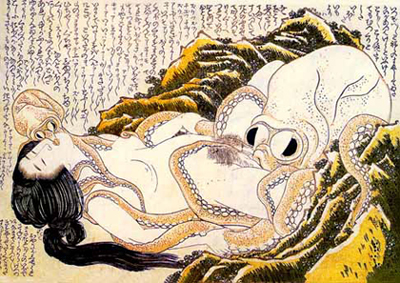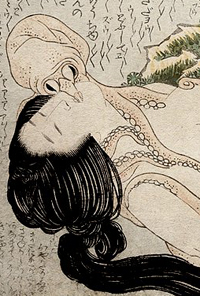“Would you still do Antonio Banderas if he was an octopus from the waist down?”
My husband asks things like this all the time, bizarre and inappropriate questions, delightful questions, which I usually answer with good humor and perhaps a thrown shoe. That time, however, I was caught by surprise.
“No!” I said. Then “Yes!” followed by “Maybe!” and at last, an anguished “Hell, I don’t know!”
I’d voluntarily watched and enjoyed movies like La Blue Girl, and I had a computer file full of graphic hentai tentacle pics, but hey, what budding geek pervert doesn’t? After that question, though, I began to suspect that I had a thing for tentacles. Not a major one, but it was sort of like driving a red car: suddenly they were everywhere. And not in the way I had expected.
A good friend professed a breathtaking crush on Sholto, from Laurell K. Hamilton’s Merry Gentry series. I read the books. Well, duh, I thought, but he’s an exceptional case, right?
An acquaintance online linked to a Will Turner/Davy Jones slashfic, explaining that it illustrated her thing for tentacles perfectly. I read it. I felt dirty. It was still kind of hot.
Another online contact confessed to having a thing for Doc Ock. To my surprise, I understood. It’s the manipulator arms.
By the time a very good friend confessed a rampaging desire to be held fast and violated in every orifice by a swarm of black, rubbery tendrils, I had come to a belated realization. These people weren’t fantasizing about watching. They were fantasizing about doing it, up close and personal. And most of these people were women. It wasn’t quite what I imagined the face of tentacle fetishism to look like.
When another friend asked if she could name a character in an original tentacle story after me—and I said yes—I decided that I needed to take a longer look at the whole tentacle thing. I needed to know why.
So I did what any reasonable person would do: I asked everyone I know. I even put up a questionnaire on my personal journal. Strangers and friends answered, a surprising cross-section that included people of all orientations and genders. The results were hardly scientific, but the answers made for fascinating reading.
A lot of folks say it all started with The Dream of the Fisherman’s Wife. Interpretations tend to say more about the person doing the interpreting than about Hokusai’s woodcut itself. The imagery still seems wholly horrific to some, but the beautiful pearl diver with the uncoiling hair is not being restrained or raped. She is in the many arms of her lovers who caress her, kiss her, support her. The signs that it is meant to be erotic are all there.
What isn’t there is a sense of violence, of violation. That began much later, arguably when director Hideki Takayama adapted Urotsukidoji for animation. The sadistic themes were not present in Maeda Toshio’s original manga, nor was the tentacle rape scene. It was that scene that most fans believe spawned the genre.
It’s that version that has become most familiar to us, not the pearl diver’s dream. When you start talking tentacle penetration, most people think “tentacle rape” and flash to images of anime-style schoolgirls struggling in the grip of writhing, demonic tentacle-penises. They think Urotsukidoji, La Blue Girl, the Inju images.
Depictions of eroticised violence, even of the non-tentacular variety, are hardly rare. We create them because the vision of beauty violated by the monstrous instinctively fascinates us, and when it’s done, we shy from it, and that’s instinctive, too. “There is nothing that arouses a stronger response in human beings than either sex or violence,” Takayama is oft-quoted as saying. “A mixture of the two is very powerful indeed.” Tentacle fantasies are an extension of this, whether one is an observer, subject, or the tentacle beast itself. Violence and the erotic urge have their tendrils wrapped around the very foundations of our psyches.
It was not the idea of physical harm that was arousing most of my respondents. They wanted rough handling, but injury? No. Hurt and loss of control are two separate kinks. In the tentacle fantasy, as with many rape fantasies, it’s all about helplessness. The unavoidable violation is the vehicle for the complete loss of bodily control, not the means by which grievous bodily harm is done.
There’s great appeal in the idea of a battle of wills, but sentience wasn’t a requirement for my respondents. Many cited the thrill of being at the nonexistent mercy of something so strong, so monstrous, something driven by its own dark instincts. The inevitability is key. As one of my respondents pointed out, “It removes the sense of doubt and allows one to focus solely on the anticipatory pleasure.”
Even with those who imagine themselves willing participants, the theme recurs. In the words of Mindy, “The penetrations are technically consensual, but they’re almost always forceful.”
Salix elaborates. “The sex is consensual, but I am restrained and not in control. Maybe that’s why I like this fantasy—being out of control frightens me in real life.”
Of course. What more delicious arousal is there than the threat of what we fear most? The thing that tempts us and terrifies us. The thing that we dread so much we will not go to it, and instead wait, hoping and fearing that it will come for us. What safer place to explore the forbidden than in a fantasy incorporating something that doesn’t even exist?
A recurring theme of forced impregnation winds through the fantasies recounted to me. It’s not an unusual thing to find side by side with captivity fantasies and rape fantasies, and while this theme is likely to make people squirm miserably when first introduced, its roots are not so hard to fathom. Being forced to incubate an alien creature’s spawn is a continuous and unrelenting bodily violation. It didn’t surprise me at all that a number of these women reported that they don’t want children. Again, it’s fear that makes the terrible irresistible, that gives it that emotional kick.
In the opinion of a friend and long-term tentacle devotee, the motif of tentacle as captor, ravisher, impregnator, may be a means of reconciling fantasy with a personal morality that acknowledges the very real—and inexcusable—horrors that occur in real life. “Maybe to some degree, including a non-human in the fantasy is a way to ease the cognitive dissonance of being aroused by something you find morally appalling. The inhumanity might also function, for some, to make the fantasy less threatening: it’s a rape fantasy that has absolutely no chance of coming true.”
You can’t ignore the physical appeal of the whole thing, either.
In the words of the staff at Whipspider Rubberworks, “Tentacles are physically so well suited to the penetration of human orifices, and many people find the idea of being sexually violated by a tentacle-bearing creature, be it from outer space or the ocean, sentient or mindless, to be incredibly erotic.” They ought to know. They make what is sworn to be the highest-quality tentacle sex toy on the market. That toy is their best seller, and demand for it is high. That there is a thriving market for such things says a great deal about the power of the tentacle to seduce.
The thought of such strange and intense sensations is beguiling. To be held fast, touched everywhere, penetrated in every orifice, to be taken from an unwilling state and driven roughly, irrevocably toward a frenzied sexual peak that the human body and mind were not meant to withstand . . . that’s a powerful fantasy. It crosses gender and orientation lines as if they did not even exist. It is perhaps the ultimate penetration fantasy, and if it’s a bit outré, well, that’s part of the fun.
“I think it appeals because it’s mysterious and not something that anyone would generally encounter, which makes it very exotic. For me, it’s the mysterious and unexpected. It’s like an orgy of arms without all the people,” Mel said. “I can’t imagine a middle ground with tentacles. Much of it is all about the absolute abandon of the moment and the novelty of it.”

There’s a particular detail in The Dream of the Fisherman’s Wife that convinces me that hers is a dream of such ecstasy. As the enormous octopus sprawls between her thighs, she has reached down and wrapped her hands tight around two of its embracing arms. She is drawing it toward her, not pushing it away. I don’t hesitate to say that gesture is familiar to me.
That passion is the same fantasy of every person who has ever dreamed of being carried off by pirates and ravished into a state of perpetual ecstasy, the same passion of the vampire’s orgasmic embrace, the werewolf’s bestial lusts, and so many more. The tentacles may be exotic, but the theme is familiar.
In the words of an anonymous respondent, “Ain’t nothing wrong with your basic tentacled sex god taking a sweet young thing in hand and showing her what’s biologically possible when you truly, finally have ALL of the right equipment.”
Amen to that.
Most of the people I spoke to reported that there was no single source that perfectly captured the essence of their own fantasy. Many of them had only seen a few pictures, a single movie, read a single story. Their fantasies sprang from single seeds, inspiration swiftly growing into something new and unforseen and theirs alone, and now they’re shared through a seemingly endless and endlessly novel stream of fanfiction and chat and roleplaying and fan art.
It’s often dismissed as a geek thing, and it’s true that the geeks and dorks and nerds brought the source material over here one magazine and fan sub at a time. They popularized it with private viewings, word of mouth. Time has passed, the web has come into its own and now has tendrils in every age group and subculture. It continues to introduce people to new fantasies and allow them to share the fantasies they already have in ways previously unimagined and unrivaled.
Every turn-on exists for a reason. The more alien a kink is to our own experience the more we tend to reject it as threatening or revolting. But if you dig down far enough, you will almost always find that you can relate—perhaps better than you would like. If you keep asking “why” long enough, you may encounter a desire much like your own. It can be uncomfortable when the abyss gazes back.
There’s a tendency to regard elaborate, bizarre sexual fantasies as pathetic somehow, as a sign of inadequacy. This becomes more true the further from normal and the further from reality the fantasy is. People are quick to say “Here’s a person whose real sex life is so boring or frustrated that they can’t even fantasize normally.”
It’s an unfair characterization. Fantasies are part of a person’s “real” sex life, and having a fulfilling real-world sex life doesn’t mean people don’t need fantasy. We do. We need it desperately, and there is nothing pathetic about that. It’s an incredibly human, incredibly creative thing to do.
I have more than my share of impossible fantasies, dark fantasies, and no matter how disturbing some of them appear when dragged into the light, they are not horrible. The idea of trying to limit my intellectual explorations to the clean, safe, normal, and possible . . . that is horrible. Fantasy is the only place where it’s safe to play dangerously, where we can cross any limit, become anything at all, do anything we can imagine, and still come back again, and so we do.
We can’t help ourselves.
Amanda Gannon is an artist, writer, master profaniteer, and the Arts and Culture editor for Weird Tales.










